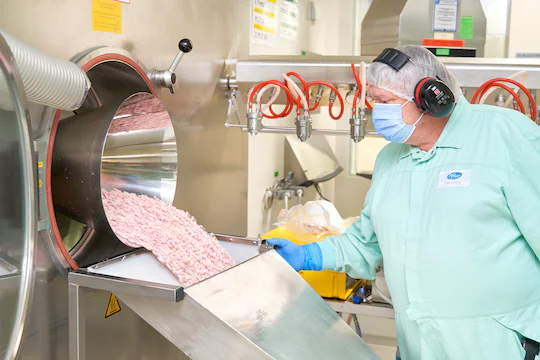
By Carolyn Y. Johnson
As the omicron variant threatens to wipe out a mainstay of coronavirus treatment, Pfizer announced Tuesday that in a final analysis, its experimental antiviral pill sharply reduced hospitalizations and deaths among people at high risk of severe illness because of age or underlying medical conditions.
FAQ: What to know about the omicron variant of the coronavirus
Reinforcing an earlier analysis from November, Pfizer’s drug cut hospitalizations and deaths by nearly 90 percent when taken within three or five days of the onset of symptoms, the company announced. Preliminary laboratory studies suggest the easy-to-take drug will hold up against the omicron variant.
Two antiviral pills, Pfizer’s and one from Merck, are under consideration by regulators — and additional safe and effective treatment options can’t arrive soon enough.
The omicron variant that is rapidly taking over in South Africa and countries in Europe will probably evade — or at least severely diminish — many forms of the main tool physicians have, known as monoclonal antibodies, according to recent laboratory studies.
“We’re working with urgency to really make sure we can have this treatment available,” said Annaliesa Anderson, Pfizer’s chief scientific officer of bacterial vaccines.
Authorization of both pills is expected by the end of the year, according to a person familiar with the situation who spoke on the condition of anonymity because they were not authorized to speak publicly.
In an early analysis, a second ongoing study that was designed to test whether the pill, called Paxlovid, relieved covid-19 symptoms faster in people who are not considered high risk found no benefit for symptom relief. But the pill regimen did cause the amount of virus in patients’ bodies to plummet and reduced the already low risk of hospitalization and death, though the result was at the edge of statistical significance, a sign that it could be due to chance.
The study of lower-risk people included those who were vaccinated and had at least one risk factor for severe covid.
Oral antiviral treatments are badly needed amid a surge of the delta variant and the still unknown threat of the omicron variant.
Mounting evidence has suggested that monoclonal antibodies, laboratory-brewed molecules that block the virus by recognizing the distinctive spikes on its surface, will have trouble recognizing and stopping omicron’s heavily mutated spikes.
Regeneron Pharmaceuticals warned in late November that its monoclonal antibody cocktail could be less potent against the omicron variant and emphasized its continuing efforts on next-generation drugs that were more likely to work against the variant. A preprint study published Thursday found that the omicron variant could evade cocktails from Regeneron, Eli Lilly and AstraZeneca, which last week received authorization for a monoclonal to prevent covid-19 in people whose immune systems do not respond to vaccines.
Brendan McEvoy, an AstraZeneca spokesman, said the company remains hopeful that its drug, called Evusheld, “will retain efficacy against the new variant. … We are conducting studies to evaluate Evusheld against Omicron, with data anticipated in the coming weeks.”
Allison Howell, a spokeswoman for Eli Lilly, said the company is working to understand the threat the omicron variant poses to its monoclonal treatment.
“It has always been our view that additional monoclonal antibodies may be needed to address the evolution of the virus, including emerging variants that can differ by country or even by state,” Howell said.
Of the authorized monoclonal antibodies, one from GlaxoSmithKline and Vir Biotechnology is expected to hold up against the newest variant.
The companies reported last week that their drug, sotrovimab, was only slightly less efficient at blocking the omicron variant in a lab test. Other studies have reached a similar conclusion.
“We are confident that sotrovimab will continue to provide significant benefit for the early treatment of patients hoping to avoid the most severe consequences of COVID-19,” Vir chief executive George Scangos said in a statement.
The potential loss of some monoclonals will intensify the urgency to develop antivirals that interfere with the virus’s ability to make copies of itself. The Merck drug introduces mutations into the viral genome. The Pfizer drug disrupts an enzyme the virus needs to make copies.
Both pills may have some limitations.
The Merck pill regimen, molnupiravir, which was modestly effective in its clinical trial, has raised concerns about its potential to cause mutations — either in the people who take the pill or in the virus itself. Advisers to the Food and Drug Administration narrowly voted in late November to recommend that molnupiravir receive emergency use authorization, but it is likely the drug will carry recommendations that it not be used during pregnancy.
Some outside experts had been interested to see the data from the Pfizer pill because Merck’s initial data looked more promising than the final analysis. Molnupiravir cut the risk of hospitalization or death by about 30 percent.
The Pfizer regimen cut hospitalizations and deaths by 88 percent when taken within five days of symptoms among high-risk people, a result consistent with its first analysis. The drug contains a medication, ritonavir, that can interact with many commonly taken medicines, and those risks may need to be managed by physicians and pharmacists.
“From our perspective, that’s something that’s going to be manageable, with a severe life-threatening disease,” Anderson said.
Laurie McGinley contributed to this report.


Be the first to comment